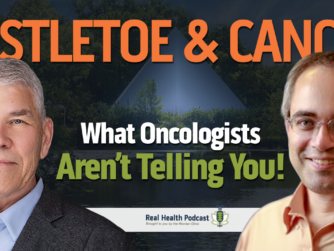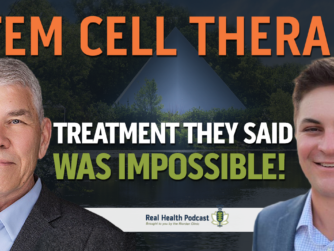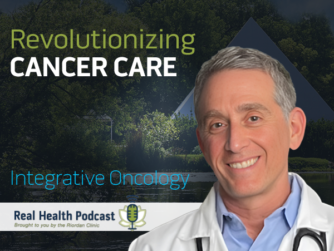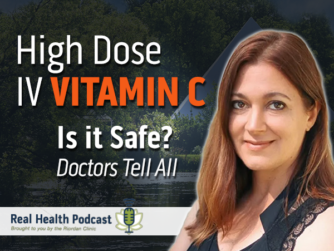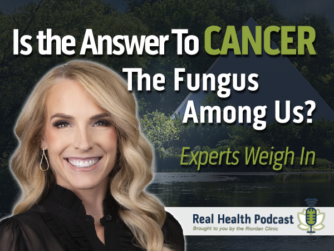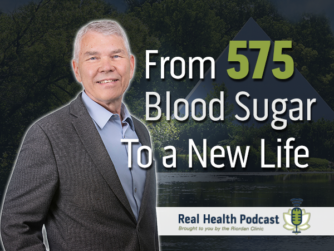In this episode of the Real Health Podcast, Chief Medical Officer Dr. Ron Hunninghake, MD, talks with fellow integrative oncologist and co-worker Dr. Stacy Dunn, ND, LAc, FABNO, FABORM, who shares thoughts and practical tips for breast cancer prevention.
Watch the Video
Thanks to this Episode’s Sponsor
Bio-Center Laboratory: https://biocenterlab.org/
Links
Learn more about the host:
Dr. Ron Hunninghake, MD: https://riordanclinic.org/staff/ron-hunninghake-md/
Learn more about the guest:
Dr. Stacy Dunn, ND, LAc, FABNO, FABORM: https://riordanclinic.org/staff/stacy-dunn-nd-lac-fabno-faborm/
Learn more about Riordan Clinic: https://riordanclinic.org/
Read the Transcript
Disclaimer: The information contained on the Real Health Podcast and the resources mentioned are for educational purposes only. They’re not intended as and shall not be understood or construed as medical or health advice. The information contained on this podcast is not a substitute for medical or health advice from a professional who is aware of the facts and circumstances of your individual situation. Information provided by hosts and guests on the Real Health Podcast or the use of any products or services mentioned does not create a practitioner/patient relationship between you and any persons affiliated with this podcast.
Intro: This is the Real Health Podcast brought to you by Riordan Clinic. Our mission is to bring you the latest information and top experts in functional and integrative medicine to help you make informed decisions on your path to real health.
Dr. Ron Hunninghake: Well, hello everyone. This is Dr. Ron Hunninghake, and it’s another episode of the Real Health Podcast. And I’m delighted today that Dr. Stacy Dunn, one of our naturopathic oncologists, is here with us to talk a little bit about prevention. So Dr. Dunn, thank you so much for coming on board again today.
Dr. Stacy Dunn: Thank you for having me.
Dr. Ron Hunninghake: So, we were just talking a little bit beforehand about how, as we do see quite a few cancer patients here at Riordan Clinic, and that, unfortunately, a large number of them have been breast cancer patients, and that we’re seeing even more of the younger women coming in with breast cancer. And so what we thought might be a good way to kind of bring everyone up to speed in terms of prevention is just for us to talk about what are the things that any woman at any age, what do we need to be focusing on to help women reduce their risk for getting breast cancer? So I hope that’s a good topic that you feel comfortable with.
Dr. Stacy Dunn: Absolutely. That sounds wonderful.
Dr. Ron Hunninghake: Okay. Well, there are people who have really thought deeply about this, and I want to just off the bat recommend a book to our audience. It’s called “Anti-Cancer Living.” Lorenzo Cohen is the director of the Integrative Medicine Department at MD Anderson. And this book came about as research that he engaged with a good friend of his this. There was a doctor that wrote a book called “Anti-Cancer,” Dr. David Servan Schreiber, and Dr. Schreiber himself got cancer. But what he found out though is that there was very little written about what a person could do to prevent cancer in the first place. And then if you do get cancer, do these same things apply? And so what Dr. Cohen came up with in his book was six areas, and I’ve had one other area that typically relate to helping us reduce our risk for cancer. And so what we’ll do, Dr. Dun is maybe just take these one at a time and go through them. Interestingly enough, he mentions relationships and having really strong relationships as a way of preventing cancer.
Dr. Stacy Dunn: Absolutely. It is so important. Absolutely.
Dr. Ron Hunninghake: How does that work though?
Dr. Stacy Dunn: How would that work?
Dr. Ron Hunninghake: How does that work? How does having a good relationship reduce your risk of cancer?
Dr. Stacy Dunn: Well, I think it mitigates stress for one, and it increases your internal joy. And that joy, I think, helps to reduce inflammation, and just, yeah, I think it’s a powerful tool.
Dr. Ron Hunninghake: There’s a whole field of psychoneuroimmunology.
Dr. Stacy Dunn: Absolutely.
Dr. Ron Hunninghake: So we now know that the immune system responds to our stress or to our wellbeing. And so this is where working at maintaining healthy relationships can actually help reduce your risk for getting cancer. And as you mentioned, stress, if you’re constantly at war with people, your stress load’s going to be high, and that’s going to weaken your immune system and maybe even deplete certain nutrients like vitamin C that would be otherwise protective for you. So these things do play into it. Also, if you’re stressed, you’re not going to sleep as well. And I’m just blown away by the studies on how important sleep is.
Dr. Stacy Dunn: Absolutely, yes, yes. We know for example, that people that work night shifts have higher rates of cancer, and so sleep is vital to immune health
Dr. Ron Hunninghake: And people should be looking into whether or not they have sleep apnea because if they’re not breathing properly at night and they’re not getting enough oxygen, we know that cancer cells, if they’re deprived of oxygen, they just start growing even faster and more. So getting a good night’s sleep also means making sure that you oxygenate well during the night.
Dr. Stacy Dunn: And that’s a time that our cells are able to repair and it’s, it’s not only important to get enough sleep, but those hours of which you get that sleep is also important, and that it’s following the circadian rhythm, and that we can have sufficient production of melatonin and another hormones that suppress our appetite during the day and help control our weight are produced at night. If you’re sleeping along with nature.
Dr. Ron Hunninghake: It’s surprising how powerful melatonin is as an antioxidant. And so certainly making your own is the best. But people, I think taking melatonin, a lot of times people think that they’re taking melatonin just to put themselves to sleep, but it may actually be augmenting the quality of your sleep as well and helping with your detoxification systems. That’s a big one right there. So it’s interesting how these different categories intermix. Detoxification is a really important factor in helping men and women avoid cancer. But we don’t think of sleep as being a detoxification strategy, but it is.
Dr. Stacy Dunn: It is. That absolutely is. Yes, definitely.
Dr. Ron Hunninghake: So your body’s liver, the lymphatic systems, all these things, need time to help clear out things. And I’ve read a lot of information about how during the night there’s a lymphatic system in your brain that opens up, and it’s like the dishwasher is going on while you’re sleeping, cleaning away the muck of the day, and then that helps you handle stress better. And if you handle stress better, wouldn’t you think a person’s going to make better food choices?
Dr. Stacy Dunn: Right, right. Absolutely. It all plays together.
Dr. Ron Hunninghake: In your experience, if you were going to give some advice to a woman about making better food choices, let’s just talk in general terms. What would we say would be some of the best ways to eat in order to prevent cancer?
Dr. Stacy Dunn: Yeah, I think lots of vegetables and fruits, kind of more of a low-grain Mediterranean diet, is what I generally recommend. Lower carbs in general, but lots of fruits and vegetables and some healthy sources of meats and good healthy fats. You want to keep your blood sugar on the lower end, so the carbs and greens can help increase that. So reducing those are really important because that insulin can be a growth factor. So we want to keep your blood sugar down and insulin levels lower. And so a lower green high vegetable diet is ideal.
Dr. Ron Hunninghake: Cancer cells just love glucose and sugar, and unfortunately in our culture, so do we. But we we’re inadvertently feeding these cells because they have shifted to this different type of metabolism, which thrives on sugar. It’s interesting that the vitamin C molecule is very similar to the glucose molecule because in most creatures, we make glucose, or excuse me, we make vitamin C from the glucose molecule. But if we can take more vitamin C, the cancer cells will actually uptake more of that, and that can help the body to control the growth of the tumor cells as well.
Dr. Stacy Dunn: Absolutely. And when we talk about prevention and blood sugar, and yes, sugar feeds cancer, but when we’re talking on a prevention scale, the higher blood sugar is going to cause a suppressed immune system and make you more vulnerable to cancer. And not only does it decrease your white blood count, but it can also decrease the activity of those white blood cells, their function. And so it is, yeah.
Dr. Ron Hunninghake: Exactly.
Dr. Stacy Dunn: There’s a role in prevention as well.
Dr. Ron Hunninghake: So I’m going to show the audience something. I’m going to display my arm here. This is a continuous glucose monitor, and it’s been a very interesting experience for me. And so just along the line of what we were talking about, sugar feeds cancer, most people don’t know that different foods trigger different levels of blood sugar in the body, and it varies from person to person. And so one of the things that’s really helped me to see, just to use one example, is that if I do eat something sweet, but if I go out and exercise right away,
That blood sugar comes right down. So it’s a kind of an incentive after you’re done eating to go out and walk around the block or take a one-mile walk if you can, just to keep a better control of your blood sugar. Then the high-color foods that we were talking about in addition to the phytonutrients, it seems like high-color foods have less of a blood sugar spike. I don’t know, maybe that the phytonutrients help the body process those sugars better fiber eating foods that are higher in fiber, that tends to level out the blood sugar. And when you actually see it and every five minutes, it will give a reading on your phone and you can actually find out how much of a difference it can make. I found out one of the things that’s changed greatly because of this is I used to have wine or a beer late at night, it didn’t work for me at all. I actually didn’t sleep as well, and my blood sugar was up during the night. Not to say that we’re against appropriate levels of alcohol use, but the wrong time can make a big difference, and then that in turn disrupts the sleep. So then you can’t diffuse the stress, and then you’re tired and you don’t feel like exercising. So all these things kind of fit together, but the important thing that I’m making here is that we’re all unique individuals and a lot of times we have to figure out for ourselves what’s best for this particular body in terms of reducing.
Dr. Stacy Dunn: I would like to go back to the alcohol though, because for breast cancer in particular, it is a huge risk factor, and even moderate intake of alcohol for women will greatly, some studies show 40% to 50% increased risk with even moderate alcohol use, and that could be one glass of wine a day. Yeah, so it is important to, that is I think a big piece of the dietary recommendations. It does include abstaining for the most part from alcohol.
Dr. Ron Hunninghake: Right?
Dr. Stacy Dunn: Yeah. Occasional use is okay. Occasional, and definitely daily drinking is not a good measure.
Dr. Ron Hunninghake: Also, I just thought of another addition to the going out and exercise. After you have a high carbohydrate meal, you’re getting more sunshine, and if you get more sunshine, your body’s making more vitamin D.
Dr. Stacy Dunn: I agree.
Dr. Ron Hunninghake: Isn’t there a ton of research now that vitamin D is very protective?
Dr. Stacy Dunn: So much research on vitamin D. Yes. Protective for so many different types of cancers, and it’s such an easy thing to do to take vitamin D and to go out and get, and you should get your levels checked and see where you are.
Dr. Ron Hunninghake: Twice a year. If you think you’re at any risk for cancer, I suggest getting your levels checked twice a year, or at least until you’re maintaining really good levels. We’ve learned at the Riordan Clinic that this concept of functional medicine, that if you measure something on yourself, and you find that it’s low, you’re much more likely to change your behavior than if your doctor or a friend or someone says you need to be taking more vitamin D. Okay, okay. I will absolutely.
Dr. Ron Hunninghake: Well, maybe you will, maybe you won’t. But if you measure yourself and it comes in low and then you read the research on how important vitamin D is at preventing all the various cancers, then you’ll really get behind that particular behavior.
Dr. Stacy Dunn: I agree. I agree. And that way you also know what to dose. So depending on what your level is, you’ll know how much to take.
Advertisement: There’s a lot more to this conversation, and it’s coming up right after a quick break. Today’s podcast is brought to you by Bio-Center Laboratories. The Bio-Center Laboratory provides state-of-the-art lab testing and diagnostic services for healthcare providers, laboratories, hospitals, and the general public lab tests available through Bio Center include a comprehensive list of vitamins, minerals, fatty acids, amino acids, hormones, and pyros. They also provide a variety of standardized tests for disease markers. These markers include cardiovascular disease, diabetes, thyroid dysfunction, hormone imbalance, and more. Visit BioCenterLab.org to learn more.
Dr. Ron Hunninghake: So what are your recommendations these days regarding thermography, mammography? These are important early detection methods, and really thermography is not exactly an early detection, but it’s letting us know if there are some abnormalities in the vascular flow of the breast, but how do these work together? What are your thoughts on the women making use of this?
Dr. Stacy Dunn: Yeah, I mean, I think thermography is just additional information for us and in of itself is not diagnostic. So you would need additional an ultrasound or MRI or a mammogram to actually diagnose something, but I think it is great information to have. Mammogram is standard of care, and that’s what most insurance companies will cover, and it can be really helpful for detecting breast cancer. So that’s generally what I recommend just because it is covered, and it is preventative care, and not everyone can afford to request an ultrasound or an MRI or thermography,
Dr. Ron Hunninghake: Dr. Frank Shallenberger, who’s spoke at our conferences and is well-known in the field of natural therapies for cancer. He said, if you are having a mammogram or any kind of radiologic testing, double or triple your melatonin that night, if you take it because melatonin does have a radiation negating effect. It won’t interfere with the study itself, but it’ll reduce your body’s exposure to the radiation.
Dr. Stacy Dunn: I think that’s a great strategy. Absolutely. Yeah.
Dr. Ron Hunninghake: So one other area that involves our environment, and we just don’t think about it or see it, but I think it’s happening more and more, is environmental toxins.
Dr. Stacy Dunn: Oh, I agree.
Dr. Ron Hunninghake: So just to throw one out, glyphosate. Glyphosate is if you live near a field or if you’re in a farming community, you’re going to have a lot of exposure, but we’re finding out that it’s been even getting in the water.
Dr. Stacy Dunn: Absolutely.
Dr. Ron Hunninghake: So people need to be aware of that. Maybe periodically test for it if you’re concerned, and certainly try to buy organic type foods.
Dr. Stacy Dunn: Exactly. Yeah. I think buying organic when you can is really imperative, and it is just ubiquitous in our environment right now. And so many other chemicals. And I do think that that plays a huge role, especially in all of these. We’re seeing younger and younger women with a breast cancer diagnosis, and I think that that’s playing a huge role because these women have grown up around these millions of chemicals that really haven’t been tested, and many of which that have been tested have been found to be carcinogenic. And so I don’t think that’s going to change until our environment changes.
Dr. Ron Hunninghake:
Plastics. My understanding about certain plastics is that they actually have estrogen-like effects, and so be careful about drinking too many things out of plastic bottles.
Dr. Stacy Dunn: Right.
Dr. Ron Hunninghake: Especially, you should never heat something in plastic in the microwave because …
Dr. Stacy Dunn: I agree. Yes. Yeah. Use glass to heat something in the microwave or wherever you’re heating it, drinking warm drinks, you should drink out of glass or stainless steel, not plastic. Yeah. BPA is another source of those endocrine disruptors, and those are found in most canned … I mean, it’s changing a little bit now, but in canned products …
Dr. Ron Hunninghake: The lining of the cans,
Dr. Stacy Dunn: Yeah.
Dr. Ron Hunninghake: But there are a lot of them saying changed.
Dr. Stacy Dunn: Oh, go ahead.
Dr. Ron Hunninghake: A lot of them are saying no, BPA, so that’s something to look for if you’re wanting to stay away from plastics.
Dr. Stacy Dunn: It is, but they’re now adding vinyl chloride instead of … or PVC instead of BPA, so they’re substituting one carcinogen for another. So yeah, avoiding canned foods would be ideal.
Dr. Ron Hunninghake: Back to the interaction, though, if you’re out walking or jogging or doing saunas, and you’re sweating more, you’re going to be helping your body remove toxins. Yes. So these are all lifestyle things that you kind of just have to weave into your weekly experience, maybe daily if you can. But certainly once or twice a week if you can get out there and sweat, it’s going to be beneficial.
Dr. Stacy Dunn: Absolutely. And there are so many studies on exercise and breast cancer, breast cancer reduction for primary prevention, but also reducing the risk of recurrence for women that have had a breast cancer diagnosis. So it’s really pretty profound. I mean, I think that you can reduce your risk up to 55% by exercising regularly, especially to prevent recurrence.
Dr. Ron Hunninghake: A more touchy area is this whole area about birth control hormones and where are we at in that because I know there’s a lot of concern about that and bioidentical hormones versus synthetic hormones versus the hormones that’s in foods. That’s another factor. We didn’t even mention that, but a lot of the animals, the livestock are fed hormonally based. They’re given hormone shots or they’re getting hormones in their diet. So do you have any suggestions for people and just in terms of this broad topic?
Dr. Stacy Dunn: Yeah, I mean, I think it is a risk factor, and so I think every woman has to weigh the risk versus the benefits. And I think speaking with your healthcare provider and your naturopathic physician or functional medicine provider and running some tests and looking at how you’re metabolizing your hormones and how you’re detoxifying, and maybe even looking at some snips to see how those hormones may affect you personally and weighing those risks versus the benefits. Because birth control is a need, and some women suffer terribly from menopausal hot flashes of night sweats, and hormones can be helpful for bone support and menopause as well. So you just have to weigh, but it is a risk. It is a risk. Birth control and hormone replacement therapy does increase your risk of breast cancer.
Dr. Ron Hunninghake: Do you have any recommendations regarding self-exam? Is that something that you still encourage women to do?
Dr. Stacy Dunn: Absolutely, I do. Yes. I had so many of my patients found the masses themselves found …
Dr. Ron Hunninghake: And an earlier diagnosis always makes a better prognosis.
Dr. Stacy Dunn: So much better. So much better. Yes, much better prognosis. Yes.
Dr. Ron Hunninghake: Yeah. Okay. I guess the last thing that I’m thinking of is terms of supplements. A lot of times we assume if we just eat colorful foods, we’re going to get all the nutrients we need. But I know here at the Riordan Clinic, one of the big ah-ha moments is when people get their nutrient laboratory tests back, and all of a sudden, they can see three or four major gaps in their nutrient team. And a lot of times, the advertisement is such, take this phytonutrient for that problem. But what I think is missed oftentimes is that food and colors and nutrients in food, it works like a team. And what we’re doing at the rear end clinic is we’re looking for the gaps in the team because that’s where you’re going to lose your football game is if you have one or two players that aren’t doing their job. And so you want to be able to determine where those gaps are and then fill them in. Certainly eating whole foods and colorful foods and the low sugar foods, all those are good ideas, but I sure do encourage people to periodically get your lab tested and see what your nutrient reserves are.
Dr. Stacy Dunn: I agree. I agree. And I let somebody is seeing me for prevention. Then I will also run inflammatory markers and other things that we can address. And addressing that with food isn’t always possible. You have to use therapeutic doses of certain nutrients or herbs to be able to reduce that inflammation.
Dr. Ron Hunninghake: Yes. And speaking of inflammation, one of the unthought-about causes of a high C reactive protein or inflammation marker is dental infections are what some people call toxic teeth. And there’s some pretty good evidence that if you’ve got a bad root canal, if you’ve got an infected gums, that that can drain through your lymphatics down to the breast and put you at a higher risk. And so sometimes we will refer our patients to a dentist, a holistic dentist who will do a scan of the mouth to find out if there are any hidden infections. So I think that’s something that’s most people don’t think about, but it can have big …
Dr. Stacy Dunn: Right. That’s a great thing to keep in mind. That’s not something I refer for regularly either, so I’ll to that.
Dr. Ron Hunninghake: So in general, what we’re hoping people will do is to be more responsible for themselves, be more alert, read up on these things, and because I think education and information is still the most powerful driver that we have to help us stay ahead of these trends where younger women are coming up with breast cancer, colon cancer, pancreatic cancer. So these are the types of things that if we give it extra attention now, we can help head this off before it becomes a serious threat to a person’s health and wellbeing.
Dr. Stacy Dunn: Absolutely. Yeah. I mean with breast cancer in particular, only 5% to 10% are genetically based, and so the rest are really influenced by lifestyle.
Dr. Ron Hunninghake: So we are so pleased to have you working with and for our patients here at the Riordan Clinic. What’s your feeling about being in Kansas? You’ve spent a lot of your time in Oregon. How do you like Kansas?
Dr. Stacy Dunn: I love it here. Yes. It’s beautiful. There’s so much to do. Everyone is so kind. Yeah, I’m loving it.
Dr. Ron Hunninghake: And we’re just now getting to the best time of year. I’m not going to brag about summer, but I’ll tell you what, the Kansas fall is gorgeous, and the air really gets nice and cool and fresh. And so anyway, Dr. Dunn, thank you so much for joining me today, and I hope this has given the women who are listening to this, some inner motivation to do these things. These are not big steps, but you just have to do them in order to get the full benefit.
Dr. Stacy Dunn: Absolutely. Absolutely.
Dr. Ron Hunninghake: One very important way that you can learn more about how food can protect you against cancer is to download our free Food as Medicine guidebook from the Riordan Clinic. Dr. Riordan, one of his key principles was we have to look upon food as our medicine and as our true prevention, but oftentimes we think we know, but we don’t get the full picture. So hopefully, this book will guide you to a better knowledge of which foods are going to give you the best results in terms of preventing breast cancer and other types of serious illness. Thank you again. You take care. Thank you, Dr. Ron. Bye-bye.
Dr. Stacy Dunn: Bye.
Outro: Thank you for listening to the Real Health Podcast. If you enjoy this episode, be sure to subscribe and leave us a review. You can also find all of the episodes in show notes [email protected]. Also, be sure to visit rearden clinic.org where you will find hundreds of videos and articles to help you create your own version of Real Health.


